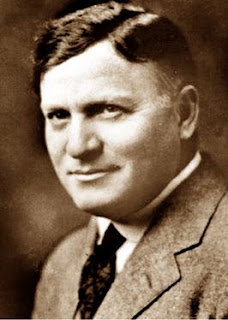Recitado por Lorne Greene
Lorne
Greene desplega su poderosa voz para recitar Desiderata, un bello poema de Max Ehrmann. A partir de 1945 el poema
se subdivide en estrofas y se cambian algunas palabras. Para saber: sobre Lorne
Greene y en vocabulario: forfeiting,
sham, y drudgery.
Go placidly amid
the noise and the haste, and remember what peace there may be in silence…
You are a child
of the universe no less than the trees and the stars; you have a right to be
here.
"Desiderata"
(en latín: "cosas deseadas") es un poema en prosa de principios de la
década de 1920, del escritor estadounidense Max
Ehrmann. Aunque sacó su derecho de autor en 1927, distribuyó copias de él
sin un aviso de copyright durante 1933 y 1942, por lo que pierde sus derechos en
los Estados Unidos. En gran parte
desconocido en vida del autor, su uso en grabaciones devocionales en 1960 y
1971 llamó la atención del mundo.
He distributed
copies of it without a required copyright notice, thereby forfeiting his US copyright.
Max
Ehrmann de Terre
Haute, Indiana, escribió el poema a principios de 1920, pero no usó ningún
título. Se registró para su copyright
estadounidense en 1927 a través de su primera frase. En 1933 distribuyó el
poema en forma de tarjeta de navidad, evidentemente titulándolo "Desiderata" porque unos días
después escribió en su diario que un editor de Kansas criticaba su "Desiderata".
Varios años antes de 1942, una mujer deprimida le dio al psiquiatra Merrill Moore una copia del poema sin el
nombre del autor, permitiéndole entregar más de 1.000 copias no atribuidas a
sus pacientes y soldados durante la Segunda
Guerra Mundial. Después de que Ehrmann
murió en 1945, su viuda publicó por primera vez el trabajo en 1948 en The Poems of Max Ehrmann. El reverendo Frederick Kates entregó
alrededor de 200 copias no atribuidas a su congregación en la Iglesia de Old Saint Paul, Baltimore, durante 1959 o 1960.
La versión de 1948 tenía la forma de un largo
párrafo en prosa, por lo que presumiblemente las versiones anteriores y
posteriores también tenían esa forma. Mucho después de la muerte del autor, en
1945, por lo tanto no autorizado por él, el trabajo se dividió en subpárrafos o
estrofas. Se dividió por primera vez en unos pocos párrafos separados por
"figuras espaciadoras distintivas" en 1970 por Pro Arts y Crescendo
Publishers. En algunas versiones, casi todas las instancias de
"y" son reemplazadas por el símbolo "&". Otras
versiones cambian "el ruido y la prisa" por "el ruido y prisa"
y "Sé alegre" por "Ten cuidado", especialmente la grabación
de 1971 de Les Crane.
 |
| Max Ehrmann |
Desiderata
Go placidly amid
the noise and the haste, and remember what peace there may be in silence. As
far as possible, without surrender, be on good terms with all persons. Speak
your truth quietly and clearly; and listen to others, even to the dull and the
ignorant; they too have their story. Avoid loud and aggressive persons; they
are vexatious to the spirit. If you compare yourself with others, you may
become vain or bitter, for always there will be greater and lesser persons than
yourself. Enjoy your achievements as well as your plans. Keep interested in
your own career, however humble; it is a real possession in the changing
fortunes of time. Exercise caution in your business affairs, for the world is
full of trickery. But let this not blind you to what virtue there is; many
persons strive for high ideals, and everywhere life is full of heroism. Be
yourself. Especially do not feign affection. Neither be cynical about love; for
in the face of all aridity and disenchantment it is as perennial as the grass.
Take kindly the counsel of the years, gracefully surrendering the things of
youth. Nurture strength of spirit to shield you in sudden misfortune. But do
not distress yourself with dark imaginings. Many fears are born of fatigue and
loneliness. Beyond a wholesome discipline, be gentle with yourself. You are a
child of the universe no less than the trees and the stars; you have a right to
be here. And whether or not it is clear to you, no doubt the universe is
unfolding as it should. Therefore be at peace with God, whatever you conceive
Him to be. And whatever your labors and aspirations, in the noisy confusion of
life, keep peace in your soul. With all its sham,
drudgery and broken dreams, it
is still a beautiful world. Be cheerful. Strive to be happy.
Max Ehrmann, 1948
Vocabulario
Forfeit: to lose the right to do or have something because you
have broken a rule.
Sham: fake, impostor.
Drudgery: hard work, labour, slave.
Desiderata by Lorne Greene
Lorne Greene
performed this version in November 1970. Leonard Nimoy did a version called
"Spock Thoughts" in 1968. The most famous recorded version was by Les
Crane, winning him a Grammy in 1971.
Para saber
Lorne
Hyman Greene, (1915 - 1987) fue un actor canadiense,
personalidad de radio y cantante. Sus papeles televisivos incluyen a Ben Cartwright en la serie de cowboys Bonanza, y al Comandante Adama en la serie de ciencia ficción Battlestar Galactica y Galactica 1980. También trabajó en el
documental de televisión canadiense Lorne
Greene's New Wilderness, y en comerciales de televisión.
Artículos
relacionados
Esto es parte del archivo: Poetry Reading
No comments:
Post a Comment